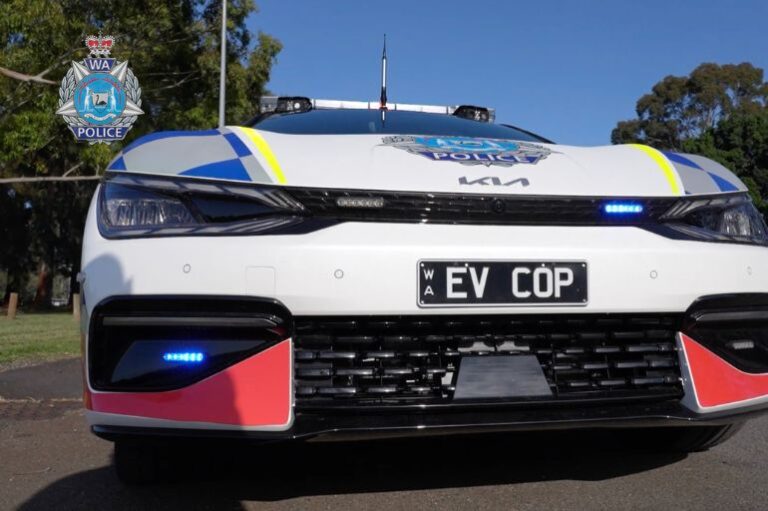WA Police Force has entered the second stage of its trial using Electric Vehicles (EVs) as frontline operational police vehicles, with a Kia EV6 entering service in the South West District as a traffic vehicle in September.
The first stage of the trial, which was commenced in June 2022, saw a Toyota Mirai hydrogen fuel cell electric vehicle (Hydrogen FCEV) trialled by officers at Fremantle Police Station, and a Hyundai Ioniq 5 battery electric vehicle (BEV) trialled by officers at Road Policing Command and officers from Midland, Rockingham, Geraldton, and Bunbury police stations.
Stage 1 of the trial provided important early indications regarding both the potential of, and limitations of EVs as frontline operational police vehicles, particularly relating to performance, charging infrastructure, and driving range.
Given the results of the first stage of the trial, further exploration of the use the BEV platform will be undertaken, through the deployment of the Kia EV6 to officers based at South West Traffic. The second stage of the trial will provide an opportunity to further test the operational capabilities of the BEV platform vehicles on a ‘single trial vehicle’ basis while other research is undertaken into the broader issues around charging infrastructure.
As a frontline operational traffic vehicle, the Kia EV6 will be exposed to a different operational driving pattern compared to the EVs used in stage 1 of the trial. The Kia EV6 will be required to travel further across a regional, or country policing district, and will likely be used for longer periods of time, including extended periods of static use at traffic incidents, compared to the shorter periods of use between tasks that would have been experienced more often in the first stage of the trial, where the EV being used was primarily used more locally to police station trial locations.
Superintendent Geoff Stewart from the South West District Office said it is important to continue to test electric vehicles in the operational police vehicle fleet to learn more about their future potential use, particularly in regional or remote areas.
“While the issues around charging infrastructure will need to be addressed over a longer period, the early trial of electric vehicles will help us learn more about the challenges we need to overcome in terms of individual vehicle performance, particularly in regional and remote settings.
“We have already learnt a lot from the first stage of our EV trial, particularly around the additional power consumption associated with police vehicles, due to the equipment fitted such as emergency lights and police communications equipment, and the way operational vehicles are used.
“Heavy acceleration, being parked at emergency scenes for extended periods of time with emergency lights activated and other police communications equipment running, and other police-specific factors saw our first trial vehicles achieve up to 30% less range than the standard EV. This has been rectified with equipment in this vehicle having its own battery power source.
“These are all considerations we need to learn more about before we can take our EV trial to the next stage, and I am very pleased to see the South West District chosen as the testing ground for second stage of the trial. Our frontline officers have a diverse range of vehicle needs, so making the most of vehicle trial opportunities now will put us in a much better position to know where it is appropriate to deploy EVs to once the broader charging infrastructure issues have been addressed.”
First Trial Outcomes
- Having the opportunity to trial both the Toyota Mirai and Hyundai Ioniq 5 vehicles provided WA Police Force with data relevant to the potential future use of these types of vehicles.
- It was evident that technology in the EV space is constantly evolving, and today’s vehicles have advanced from those tested in 2022.
- Power consumption relating to emergency driving conditions and equipment fitted to police vehicles had impacts on the driving range achieved in the first trial (up to 30% less range).
- From a performance perspective the vehicles showed great promise and proved capable of meeting many of the required performance criteria for operational police vehicles.
- However, with only one refuelling location for the Hydrogen FCEV platform, it was deemed too impractical in the current climate to continue the trial into the second stage.
- While the availability of public facing services also proved problematic for the BEV platform, and the logistics involved in establishing dedicated fuelling and charging facilities in WA Police premises is challenging, this platform proved to be suitable for further exploration.






